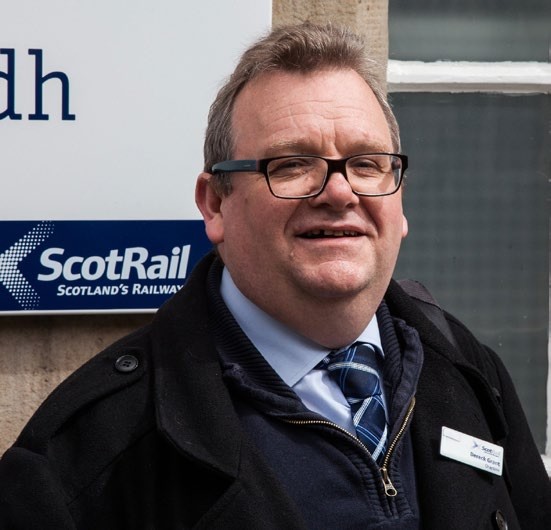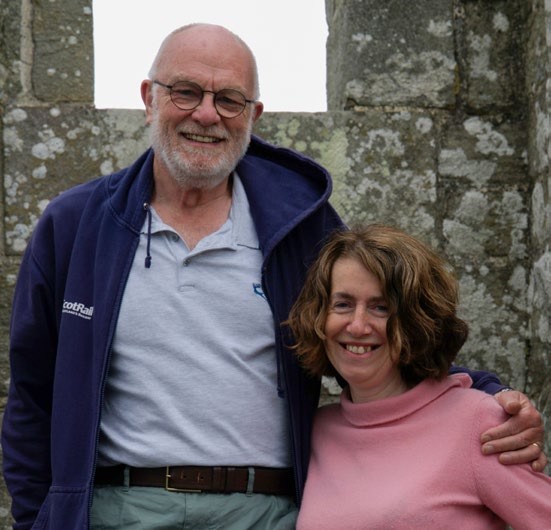FEATURE
“We genuinely care about people”
Jackie Macadam learns about the joys and challenges of chaplaincy on Scotland’s railways.
“ALL people sometimes have a need to unburden themselves, or to talk through something, often quite personal things.
For many in the industry who work in safety critical roles, it can be difficult, and can be perceived to be risky, to divulge to their manager that they are struggling, because it might impact on their employment.”
Graham Whitehead is a railway chaplain, one of two that currently cover Scotland. “Before joining the Mission, I was a professional railwayman here in Scotland for 25 years, as a conductor, a driver and as a timetable planner, starting my career with British Rail in 1992. “I met some of the chaplains when I was at work, but it was only in my later years, whilst working in ScotRail headquarters (in Glasgow), that I got to know the local chaplain at all well. When he died suddenly, I spoke to the Railway Mission Executive Director about the possibility of volunteering as a chaplain for a few hours per week, to give them some assistance whilst they went through their recruitment process. Unfortunately, this was not possible, as the chaplains must not be employed by the industry, to ensure that there is no conflict of interest or possibility of any breach of confidence. However, a seed was sown during this period.
“At that time, everything was going downhill for me until I attended a Pentecostal church in Inverness where I had an encounter with God.
“In 2016, I was considering what the next stage of my career should be. I had always wanted to work in a faith-related capacity, and the desire to work in a more people-oriented role was becoming stronger, having worked in technical roles for many years. I embarked on a part-time course at the Scottish Baptist College in Chaplaincy and Spiritual Care in September 2016. It was really the spiritual care aspect of the course which attracted me to it, but almost immediately after the course started, it was announced that one of the chaplains in Scotland was emigrating. The Railway Mission was advertising for applicants to work as a chaplain, and after praying about it, my wife and I agreed that I should apply, and that this might be the outworking of a call to ministry I had lived with for many years. I was very surprised to be offered the role. “
“I took early retirement from ScotRail in 2017 to join the Railway Mission as a Chaplain,” he says.
His colleague, Dereck Grant found his way to God via a very different route.
“I went through a very difficult time when I left the army. I lost my job, and I was kicked out of my home. At that time, everything was going downhill for me until I attended a Pentecostal church in Inverness where I had an encounter with God. I was taken in by the pastor of that church who provided a stable home for me. In fact, the pastor and his wife helped me to find an apprenticeship, and their love and kindness helped me to be the person I am today.
“My pastoral role was part-time with the Nairn Church, and I decided to look for another part-time role. I had all those childhood memories coming back to me of my grandfather who worked on the sleeper trains from Inverness to London. I did my Google search by typing in ‘Christian work on the railway’ and found that the Railway Mission were looking for someone to cover the north of Scotland. I also remembered as a young Christian meeting a man called Willie Nelson, from Elgin, who was a railway chaplain. I think that memory was the final factor that persuaded me to apply for the role in 2014. Thankfully, I was given the position after my interview in Edinburgh.”

Dereck Grant

Graham Whitehead
Both men agree that their work is immensely varied and no two days are ever the same.
“I have done a blessing of a railway worker’s wedding,” says Graham. “We are also there to comfort someone who is bereaved. We are asked to conduct funerals for someone who had a connection with the railway, such as retired staff or enthusiasts, and we are generally happy to do this.”
Both men were involved with supporting first responders – and more following the derailment at Carmont, near Stonehaven, in 2020, spending many days on site and visiting train crew depots in the immediate aftermath. They worked with the emergency services (Police Scotland, Scottish Fire and Rescue and the Coastguard Agency), and even the government officers from Transport Scotland.
“This was a very difficult and emotional time for the whole industry, and for me personally,” said Graham, “As I had known one of the rail staff who died in the accident for many years. I was inspired by the resilience and professionalism of staff in dealing with the incident whilst also grieving over it.”
Dereck says: “I could share many poignant moments like the support that I have provided to a former signaller who had lost his grandmother, mother and his sister to Huntington’s Disease. In fact, I witnessed the rapid decline of his sister’s health when I would visit her in a care home. Then the signaller was diagnosed with HD himself, so I have been with him during his ups and downs. This is not my story to tell, but it is important that people know that we are there for them in the darkest moments of their life.”
Both men agree that the Railway Mission plays an important part in the life of the railways, and all those who work with them.
“Railway Mission Chaplains provide a service which is, perhaps, unique. We are part of the industry but are not directly employed by it. This is different to chaplains in the armed forces or health service, for instance, who are employees of the relevant service. This ensures complete confidentiality, as a member of staff can be sure that no member of company management can influence or instruct a chaplain to divulge the content of any conversation, or even the fact of a conversation taking place,” says Graham.
Dereck adds: “The Railway Mission will always be needed because it is highly unlikely that suicides will ever cease on our railways. Railway workers will always face the problems that life throws at us. For example, ill health, mental health, financial difficulties, relationship issues, and personal bereavements are just a few to name. At the same time, the Railway Mission has been providing support to the rail industry since 1881, so we are part of the railway family.
“We are not just there to support people from a religious background, but people of different faiths or none, because we genuinely care about people. Sadly, some people still have this stereotype of image of a railway chaplain pulling out a Bible and lecturing them to be good people. But our role is to make sure people understand that we are here to support them or signpost them to someone who can help. Even the rail industry realises by the data that we provide them with how much we support their staff.”
“If anyone wants to contact either of us – and there will soon be a much-needed third railway chaplain – we can be contacted through the Railway Mission website, at www.railwaymission.org.”